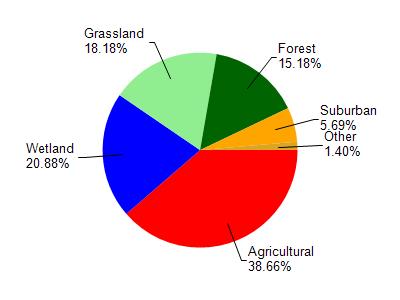Brown
No
No
No
Fish and Aquatic Life
Overview
The lower quarter mile of Gilson Creek is a forage fishery only partially supporting its full potential, due
to sedimentation and nutrient enrichment from agricultural runoff in the 3.75 miles above the escarpment.
Water resources managers believe that stream gradient may be a limiting factor in this area. The water is
relatively stagnant below the falls. The use is unknown, but WDNR fish managers believe this reach may
be capable of supporting a Class III trout fishery.
From: Willman, Guy and Mike Toneys. 2001. The State of the Lakeshore Basin. Wisconsin Department of Natural Resources, Madison, WI.
Date 2001
Author Michael Toneys
Condition
Wisconsin has over 84,000 miles of streams, 15,000 lakes and milllions of acres of wetlands. Assessing the condition of this vast amount of water is challenging. The state's water monitoring program uses a media-based, cross-program approach to analyze water condition. An updated monitoring strategy (2015-2020) is now available. Compliance with Clean Water Act fishable, swimmable standards are located in the Executive Summary of Water Condition in 2018. See also the 'monitoring and projects' tab.
Reports
Recommendations
Monitor Water Quality or Sediment
Category 3 water with a single 'Poor' fIBI. Further monitoring recommended. AU: 18086; Station ID: 10009434
Partnership Project
The Northeast Wisconsin Land Trust is proposing to develop a Community Conservation Initiative focusing on the Gilson Creek watershed located in the northeast corner of Brown County. There are two components to the project: 1) A planning component, which consists of convening planning partners and creating a site conservation plan with community input. 2) A community partnership component, which consists of outreach to landowners, community members and potential financial partners to build the private-sector base needed for protecting critical land and water resources through resource management agreement, conservation easements and preserve acquisitions.
Management Goals
Wisconsin's Water Quality Standards provide qualitative and quantitative goals for waters that are protective of Fishable, Swimmable conditions [Learn more]. Waters that do not meet water quality standards are considered impaired and restoration actions are planned and carried out until the water is once again fishable and swimmable
Management goals can include creation or implementation of a Total Maximum Daily Load analysis, a Nine Key Element Plan, or other restoration work, education and outreach and more. If specific recommendations exist for this water, they will be displayed below online.
Monitoring
Monitoring the condition of a river, stream, or lake includes gathering physical, chemical, biological, and habitat data. Comprehensive studies often gather all these parameters in great detail, while lighter assessment events will involve sampling physical, chemical and biological data such as macroinvertebrates. Aquatic macroinvertebrates and fish communities integrate watershed or catchment condition, providing great insight into overall ecosystem health. Chemical and habitat parameters tell researchers more about human induced problems including contaminated runoff, point source dischargers, or habitat issues that foster or limit the potential of aquatic communities to thrive in a given area. Wisconsin's Water Monitoring Strategy was recenty updated.
Grants and Management Projects
Monitoring Projects
| WBIC | Official Waterbody Name | Station ID | Station Name | Earliest Fieldwork Date | Latest Fieldwork Date | View Station | View Data |
|---|
| 101200 | Gilson Creek | 053544 | Gilson Creek at Shore Acres | 10/2/1992 | 4/13/1993 | Map | Data |
| 101200 | Gilson Creek | 053543 | Gilson Creek at Cth P | 6/14/1993 | 6/14/1993 | Map | Data |
|

Watershed Characteristics
Gilson Creek is located in the Red River and Sturgeon Bay watershed which is 139.16 mi². Land use in the watershed is primarily agricultural (38.70%), wetland (20.90%) and a mix of grassland (18.20%) and other uses (22.30%). This watershed has 149.91 stream miles, 20,800.31 lake acres and 16,378.27 wetland acres.
Nonpoint Source Characteristics
This watershed is ranked Medium for runoff impacts on streams, Not Ranked for runoff impacts on lakes and High for runoff impacts on groundwater and therefore has an overall rank of High. This value can be used in ranking the watershed or individual waterbodies for grant funding under state and county programs.However, all waters are affected by diffuse pollutant sources regardless of initial water quality. Applications for specific runoff projects under state or county grant programs may be pursued. For more information, go to surface water program grants.